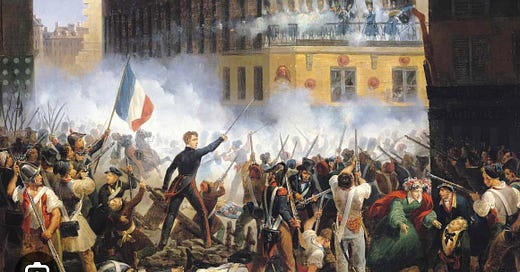The revolutionary mindset
The need for enemies, the valorization of sentiment, the aping of religion: lessons from history.
I voted for Obama in 2008. But during his second term, practically overnight it seemed like a new culture war had been launched from on high. A tightening ideological net was stretching over American life, with little audible dissent within mainstream institutions. Badly spooked, I got interested in the French Revolution as an episode that might shed light on the new dynamics. This interest redoubled in 2016 and then again in the crazy summer of 2020, when it felt like we had entered an accelerating civilizational death spiral and a full-blown “revolt of the elites.”
Of course, there is a risk of melodrama when conservatives speak of a woke Terror. Still, the FR is instructive, for the radical temptation in politics exhibits consistent patterns, and the Revolution displays them in crystalline form. Here are a few historical works on the period that are beautifully written, and may prove helpful for understanding the recent upheavals. I have borrowed freely in what follows from an article I published in 2020 at Unherd.
François Furet, Interpreting the French Revolution (1978) and The Passing of an Illusion (1995)
François Furet rescued the academic study of the French Revolution from an entanglement with Marxism that had grown debilitating in the decades after World War II. French historiographers of that period tended to project backwards onto Robespierre all the romance of 1917, and likewise to view the Soviet Union as the successor state chosen by History to advance the cause. What made this no longer tenable was the publication, in 1973, of Aleksandr Solzhenitsyn’s Gulag Archipelago. The very parallels insisted upon by Marxist historians were now damning to their enthusiasms. Just as Solzhenitsyn showed that the gulag was no mere accessory to the revolutionary state, but rather its central manifestation and meaning, so it now became necessary to ask whether the Terror was not just a regrettable episode to be excused by extenuating circumstances, but the most revealing expression of revolution as a political culture.
This question had implications for how one was to understand the revolutionary passions of the youth movement of the 1960s, and Furet did not shy from drawing the relevant lessons. A member of the French Communist party in his youth, he came to see things in rather a different light. The opening essay in Furet’s Interpreting the French Revolution offers many riches. For example, he explains the paranoid style of revolutionary politics, and its tendency to exercise power through contrived moral emergencies.
The FR is the first instance of ideological politics, which is less concerned with the contest of competing interests than it is with wielding peremptory interpretive power over events. The control of language is paramount. The FR is also an early instance of a politics based on what Furet calls a “lay eschatology” – an understanding of salvation available to all through right participation in the movement of History. In this last respect the FR is not completely without precedent: “that was how the religious wars of the 16th century, for example, had mustered most of their recruits,” Furet writes. It is not a precedent that is likely to flatter the self-image of enlighteners.
The Revolution needs enemies if it is to keep moving forward. Aristocratic plots were invoked at every turn, and this finds an echo in the role played by “domestic extremists” today. Of course this appealed to the age-old sense that evil is the work of hidden forces, but it was also perfectly tuned to the revolutionary consciousness.
The crime was sure to be heinous, since it was unavowable, and crushing the plot became a laudable and purifying act. Moreover, there was no need to name the perpetrators of the crime and to present precise facts about their plans, since it was impossible to determine the agents of the plot, who were hidden, and its aims, which were abstract.
The enemies of equality “were not real, identifiable and circumscribed forces, but constantly renewed incarnations of its anti-values.”
“The power to govern legitimately was directly related to the ability to keep up the denunciation of the aristocrats’ plot: the constant raising of the ideological stakes was the rule of the game in the new system.” This dynamic governed internal competition among the Jacobins, and so “the Revolution eventually had to face a cynical version of the aristocratic plot in which those who wielded power might call for the unmasking of a conspiracy only in order to reinforce their own position.”
The intrigues of the Revolution’s enemies, combined with a doctrine of Public Safety, exonerate the Terror as having been forced upon the Revolution by external circumstances. This according to the dominant historiography that reproduces the Jacobins’ own account. On Furet’s judgment it amounts to a causal inversion of the sort familiar to skeptical watchers of the American establishment during the Trump years.
Keep reading with a 7-day free trial
Subscribe to Archedelia to keep reading this post and get 7 days of free access to the full post archives.




